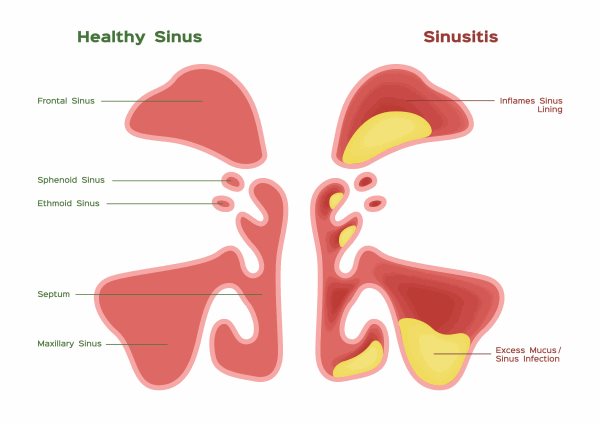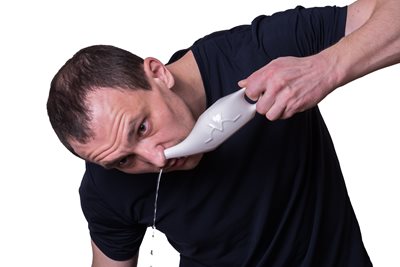As an ENT (ear/nose/throat specialist, also called an otolaryngologist), with specialized training in sinus care, I’ve seen many patients with ongoing and chronic sinus issues, so I know the misery that sinus problems can cause.
What is sinusitis and what makes it chronic?
Sinuses are the open “pockets” located behind the face. We’re not usually aware of them unless we have allergies or an upper respiratory infection (such as a cold or sinus infection). When we’re sick or reacting to an allergy, the sinuses produce excess mucus or drainage, trying to rid the body of the infection or irritant.

Sometimes, though, this process doesn’t work correctly, leading to sinusitis.
So,
sinusitis is simply an inflammation of the sinuses, marked by pain, drainage and/or congestion.
Chronic sinusitis, then, is when these symptoms are present for 3 months or more, along with inflammation that prevents the symptoms from being fully addressed.
What causes sinusitis?
Chronic sinusitis can be caused by several issues, or a combination of problems, including:
- Unmanaged allergies
- Environmental irritants, such as in a workplace
- Structural problems in the nose sinuses
- Smoking
About half of patients with chronic sinusitis have specific allergies that can be found via testing. If the symptoms of allergies (‘hay fever’) are present, I’ll refer patients to an allergist for testing. From there, we determine together if allergy shots/immunotherapy are appropriate, or if symptoms can be managed with proper medication and avoidance. (My colleague, Dr. Jason White of Deaconess Clinic Allergy, has written a
very helpful blog about managing allergies.)
When to see a specialist
It’s normal for people to have a cold, allergy flare up, etc. occasionally throughout the year. These can usually be managed with symptom-treating medication and a little bit of time to get past the infection or irritation. In between these episodes, we don’t expect people to have persistent or ongoing sinusitis-type symptoms (pressure, congestions, drainage, decreased sense of smell, etc.)
For patients who have sinusitis symptoms lasting 3 or more months, it’s time to see a specialist.
Medical management, which can include assessing allergies, considering nasal spray options, etc. will be the first step. However, when these fail, we will consider trying stronger medications (such as oral steroids). These systemic medicines can have more side effects but are particularly effective in decreasing inflammation.
For chronic sinusitis, we do use antibiotics for flares that include infection, but primarily we think of chronic sinusitis as a problem of inflammation, not an ongoing infection. This is why many people who come to see an ENT with chronic sinusitis have typically failed 5 or more different antibiotics.
For some patients with chronic sinusitis, they may have polyps, asthma, and/or a particular inflammatory response that makes their sinusitis more difficult to treat. That’s when I talk with patients about surgery, which can open up the nasal passages and sinuses to prevent obstruction and improve drainage.
Treatment Options
When I first meet a patient, I do a physical exam (including looking in the nose with a special scope) and a medical history, discussing the symptoms, allergies and other issues related to their sinus problems. Occasionally I’ll order some labs to evaluate causes and symptoms, and maybe imaging tests, to help me see the sinus structures.
From there, treatment options may vary, depending on the causes of the chronic sinusitis. Here are some possible treatment methods:
Saline Rinse
A saline rinse consists of a weak salt water (saline) solution being poured into one nostril and coming out the other nostril. As it moves through the nasal cavity, it washes out mucus and allergens. People use a neti pot, squeeze bottle or other method to perform this rinse.

Saline rinses address sinusitis by:
- Thinning out and physically removing mucous that has built up, as well as allergens that are in the nasal passages
- Reducing inflammation and irritation
- Cleansing the nasal passages, helping them function more normally
There’s not a specific amount, frequency, etc. to recommend. Just try it and see what works for you. If you’re unsure about how this process works, there are YouTube videos that can be very instructional.
Two major tips: Be sure to use the salt water packets that you can purchase at a drug store, as plain water without the salt can be very irritating to the nose and sinuses. Also, I recommend that patients use either bottled water or distilled water, especially in the summer. Warming the water to room temperature or slightly above is also more comfortable.
Intranasal steroid sprays
Intranasal steroid sprays are medications designed to reduce inflammation. They don’t typically offer immediate symptom relief—they’re designed to be maintenance medications with few side effects.
All nasal steroid sprays work in about the same way, and with the same strength. The choice of which to use depends on the preference of your doctor, although several are available over the counter.
To use these sprays correctly, here is what I recommend.
- Commit to using it every day for 3-4 weeks before deciding if it’s helping or not. (Tip: Put it by your toothbrush to remind you to take it.)
- This medication will work better with cleaned-out sinuses (i.e. after using a neti pot). A clear path helps the medication reach the inflamed tissue.
- Try to spray up and to the side, so the medication should be up in the nostril, aimed toward the eye/ear on that side. (Tip—Use your right hand to spray into your left nostril, and vice versa.).
- Common side effects can include minor nose bleeds or nasal dryness. If you experience these, I recommend waiting a few days and then re-starting at half the dose using the techniques above.
- If congestion is your primary sinusitis symptom, it may be that you have structural problems, and other treatments are needed.
Nasal and Sinus Surgery
To diagnose chronic sinusitis, we have to see inflammation in the nose with our scope, or with a CT scan of the sinuses.
Some patients complain primarily of nasal obstruction and congestion, and have open sinuses on their CT scan. For these patients, we could consider offering a surgery to straighten out any crooked septum (the dividing tissue wall within the nose) or shrinking the structures (turbinates) that swell in the nose that cause obstruction. If patients have many episodes of recurring acute sinus flares, we might also offer minor sinus surgery or the use of balloons to open the sinus passages.
For patients with polyps in the sinuses, or severe swelling of the sinus linings, the goal of surgery is open up the sinuses up as much as possible. These patients have primarily an inflammatory problem, and we want to help topical steroids and rinses reach all areas of the sinuses, and surgery helps with that. (Note: polyps can grow back, and patients with significant polyp disease may require multiple surgeries over their lives.) For these patients, we’re specifically targeting the anatomy—the physical structure—of the nose and sinuses.
Each patient will be different, but the average time for recovering from sinus surgery is a week to 10 days. Most people can return to work in a week or so.
Tips for Healthy Sinuses
- Don’t smoke! Smoking stops the correct flow of mucus in the nose, and causes inflammation in the tissues.
- If you have allergy symptoms, seek evaluation from an allergist so you can best treat and manage your allergies. Learn to avoid what you can, minimize what you can’t avoid, and medicate what’s left.
- If you notice you’re congested every time you dust, mow the lawn, etc., be sure to wear a mask and rinse your nose out after those activities.
- Keep in mind that for chronic sinusitis symptoms, the issue is often inflammation (rather than infection) and that antibiotics won’t help address this. (Acute sinusitis--with the presence of a fever and body aches that go with an infection--may respond to antibiotics.)
If you have experienced ongoing sinus issues, your primary care doctor can refer you to a sinus expert like me for evaluation and treatment. Or you can reach out to us at
Deaconess Clinic ENT and we can help you with the referral process.